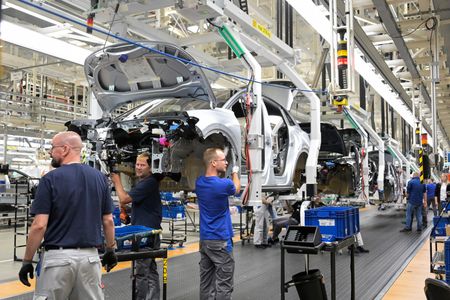By Maria Martinez
BERLIN (Reuters) -German political parties presented their election programmes on Tuesday, a day after parliament backed a no-confidence motion in Chancellor Olaf Scholz’s government, paving the way for a snap election on Feb. 23.
Disagreements over how to save Europe’s largest economy had been the main factor behind the collapse of Scholz’s fractious three-party coalition last month, and the economy is the top concern of German voters.
Germany has gone from being Europe’s economic powerhouse to underperforming its major euro zone peers. The economy is expected to contract in 2024 for the second consecutive year.
Here is what is known so far about the parties’ key economic proposals and their stance on a potential reform of the constitutionally enshrined debt brake:
SPD
Scholz’s centre-left Social Democrats (SPD) propose incentivising private investment and modernising infrastructure with an off-budget 100 billion euro ($104.90 billion) fund.
The party also plans to introduce a “Made in Germany” premium to boost investment. The plan includes a direct tax refund of 10% on equipment investments by businesses.
To incentivise purchases of German-made electric cars, the SPD proposes to offer buyers a temporary tax deduction.
Scholz calls for a “moderate reform” of the debt brake – which limits government borrowing to 0.35% of gross domestic product – in order to increase investments in defence, but he has not indicated how he would do that.
CDU/CSU
The opposition conservatives, an alliance of the Christian Democrats (CDU) and their Bavarian sister party the Christian Social Union (CSU), propose extensive financial relief for companies and citizens.
They want to cut the corporate tax and propose a uniform rate of 25%. The sales tax for catering should be lowered to 7% from 19%. They also want to abolish the national supply chain law, and pledge lower electricity charges. They have not said how they plan to finance the projects, a point criticised by other parties.
Conservative leader Friedrich Merz, who according to opinion polls is set to become Germany’s next chancellor, has signalled some openness to a moderate reform of the debt brake but his party’s manifesto has pledged to retain it.
GREENS
Economy Minister Robert Habeck, the Greens’ candidate for chancellor, has called for reform of the debt brake to allow for higher public spending.
The Greens want to invest in capital markets to generate more funds for the statutory pension scheme, creating what they call a “citizens’ fund” with loans and government resources. The fund should take sustainability criteria into account and be aligned with the 1.5 degree Celsius target of the Paris Climate Agreement.
Every investment in Germany should be subsidised by the state with a premium of 10%, limited to five years and not including investment in buildings, they say.
The election programme also includes a tax incentive for “small and medium incomes” for the purchase of electric cars, an example of their focus on targeting subsidy programmes towards lower earners.
The programme also includes raising the minimum wage to 15 euros per hour in 2025. It is currently 12.41 euros.
FDP
The neoliberal Free Democrats present themselves as the biggest defender of the debt brake. It was the refusal of former Finance Minister Christian Lindner, the FDP leader, to suspend the cap on borrowing that prompted the collapse of Scholz’s coalition.
In its draft election programme, the party proposes a reduction of the corporate tax to below 25% and of the sales tax for catering to 7%. It also proposes an immediate end to the so-called solidarity surcharge, which is paid on top of income tax and was introduced following German reunification to help the poorer eastern states.
The FDP is positioning itself against the government’s current goal of making Germany climate-neutral by 2045, saying instead that the EU target of 2050 should be used as a guide.
The ban on combustion engines for new cars registered from 2035 onwards should be lifted, and the air traffic tax abolished.
The draft programme also rejects a wealth tax and any debt competence for the European Union.
AfD
The far-right Alternative for Germany (AfD), currently in second place after the conservatives according to opinion polls, seeks Germany’s departure from the EU – or “Dexit” – following a referendum like the one that took place in the U.K. in 2016. The party wants the country to ditch the euro and reintroduce the Deutsche Mark. AfD is committed to the debt brake and proposes cutting spending on climate protection and contributions to international institutions.
The other parties have refused to include the anti-immigration AfD in any future coalition government talks.
The AfD has already presented a draft of its own election programme.
($1 = 0.9533 euros)
(Reporting by Maria Martinez, additional reporting by Andreas Rinke, Christian Kraemer, Kirsti KnolleEditing by Gareth Jones and Jon Boyle)
